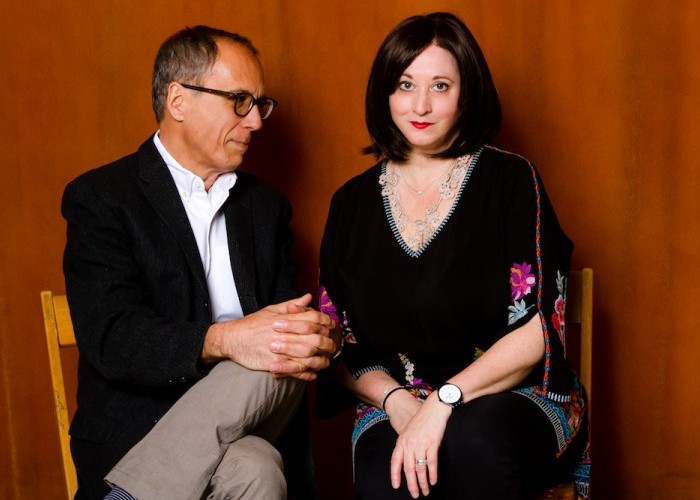Jan 13, 2026 2:09 PM
More Trump-Kennedy Center Cancellations
The fallout from the renaming of the John F. Kennedy Center for the Performing Arts to include President Donald…

David Hajdu and Renee Rosnes have released Ice On The Hudson, their first co-written album-length recording.
(Photo: Takako Harkness)In casual conversation, artists might reveal their struggles with complacency, particularly when they feel they’ve already established their sound. Separately, pianist and composer Renee Rosnes and writer David Hajdu have spent their careers defying complacency, living in possibility. And together, they developed Ice On The Hudson, an SMK Jazz release that reflects two years of creative output and two temperaments of creative inquiry.
Though the two never had met, Hajdu approached Rosnes about five years ago to ask if she might be interested in writing songs. Rosnes responded enthusiastically. From that exchange, a partnership between composer and lyricist emerged. “Everything clicked,” said Hajdu, whose past projects have included lyric-writing for Fred Hersch and Jill Sobule. He’s also a music critic for The Nation and teaches at Columbia Journalism School in New York.
“There’s a natural collaborative style in the way we deal with each other,” said Rosnes, who has released 17 albums as a leader. “One reason we feel comfortable in the partnership is because we both have very open musical minds.”
In early 2016, the pair embarked on the 11-track endeavor. From the start, they sought to abandon adherence to genre and consideration for distribution. “I don’t think either of us thought for a second about the marketplace or trends or vogues,” Hajdu said. “In every case, we started with having something that we really wanted to say. That was it.”
Then the partners lined up personnel whom they felt would honor the musical and lyrical complexities presented in their work, including reedists Seamus Blake and Ken Peplowski, and vocalists René Marie, Janis Siegel, Darius de Haas and Karen Oberlin, among others.
Hajdu identifies as a consummate scholar of the music. Musing over Lorenz Hart and Dorothy Fields, he lamented that today’s music has lost what he considers to be a sophisticated degree of care and precision. In co-creating Ice On The Hudson, Hajdu tasked himself, along with Rosnes, with bringing those elements back into the music.
“I wanted to hear more songs that have the level of craft, meticulousness and deep musicality of the standards—but with a 21st-century orientation,” he said.
Both artists describe each other’s work as layered, and accordingly, their record intercuts themes of longing, tenderness and renewal. “Certainly the emotion of the lyric plays a role in the arrangement of the pieces,” Rosnes said.
On “Little Pearl,” the conversation between Erik Friedlander’s cello and Rosnes’ piano was a deliberately evocative choice by the pianist, who wanted to conjure the sensation of viewing Earth from outer space.
With four exceptions, each song followed the same format for composition: Hajdu would write lyrics first and develop a “dummy” form—one Rosnes never wanted to see or hear. She would take only Hajdu’s lyrics, composing music around his words. “The Passage” and “Little Pearl” derived from original instrumental compositions, but Rosnes wrote “Confound Me” and “All But You” specifically for Hajdu to complete.
Despite Ice On The Hudson being her first album-length project co-written with a lyricist, Rosnes dismissed any sense of apprehension. Instead, she attributes her exhilaration to the freedom the pair enjoyed during the process.
“Fear doesn’t enter into it,” she said. “I never felt any pressure when David and I began working together. I respected him as a journalist and an author, and thought, ‘Why not give it a whirl?’” DB

Belá Fleck during an interview with Fredrika Whitfield on CNN.
Jan 13, 2026 2:09 PM
The fallout from the renaming of the John F. Kennedy Center for the Performing Arts to include President Donald…

Peplowski first came to prominence in legacy swing bands, including the final iteration of the Benny Goodman Orchestra, before beginning a solo career in the late 1980s.
Feb 3, 2026 12:10 AM
Ken Peplowski, a clarinetist and tenor saxophonist who straddled the worlds of traditional and modern jazz, died Feb. 2…

The success of Oregon’s first album, 1971’s Music Of Another Present Era, allowed Towner to establish a solo career.
Jan 19, 2026 5:02 PM
Ralph Towner, a guitarist and composer who blended multiple genres, including jazz — and throughout them all remained…

Rico’s Anti-Microbial Instrument Swab
Jan 19, 2026 2:48 PM
With this year’s NAMM Show right around the corner, we can look forward to plenty of new and innovative instruments…

Richie Beirach was particularly renowned for his approach to chromatic harmony, which he used to improvise reharmonizations of originals and standards.
Jan 27, 2026 11:19 AM
Richie Beirach, a pianist and composer who channeled a knowledge of modern classical music into his jazz practice,…